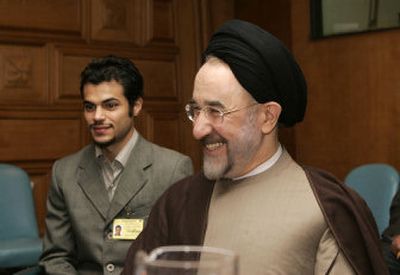Khatami predicts ‘prudence’ will prevent attack on Iran

WASHINGTON – On the eve of his first trip to Washington, former Iranian president Mohammed Khatami warned that U.S. military action in the Middle East has backfired, producing greater terrorism, imperiling the future of Iraq and damaging America’s long-term interests.
But the danger of even greater instability in the region will ultimately prevent the United States from launching military strikes against Iran over disputes about its nuclear intentions, he predicted. Although an attack on Iran would create “great damage,” Khatami said, “prudence and wisdom” are likely to prevail because of the incalculable “detriment and damage” to both the region and the United States.
“America will not make the mistake of attacking Iran,” he said, adding, “Iran is not Iraq.”
In a wide-ranging interview Monday night, Khatami said Iran is not intent on eliminating Israel and accepts a two-state solution that includes both Israel and a new Palestine – on terms acceptable to the Palestinians. He basically refuted the recent angry rhetoric of his successor, President Mahmoud Ahmadinejad, who has denied the Holocaust and called for Israel to be wiped off the map.
“The practical policy of the Islamic republic has never been to eliminate or wipe Israel off the map. And I don’t believe that this policy has changed with the change of president,” Khatami said in New York.
Khatami ran for office as a reformer and served the two-term presidential limit from 1997 until 2005.
Khatami called concern about nuclear proliferation generally “very justified” and insisted that Tehran has not rejected U.S.-backed incentives to end uranium enrichment for its peaceful nuclear energy program, a process that can be subverted to develop a nuclear weapon. A U.N. resolution called for Iran to suspend enrichment by Aug. 31 or face punitive action.
“The package has not been rejected,” he said, adding that Iran does not yet trust guarantees from the international community that it will have long-term access to fuel for energy, given past failed promises.
On Iraq’s future, he said all countries should “seriously and steadfastly” strive to prevent a civil war. He blamed the violence on terrorists who claim to act in the name of religion but instead undermine it.
He warned, however, that Iraq reflects the failure of U.S. policy. “So far, whenever the United States has tried to solve its disputes through military means it has not achieved its objectives – and also not solved the problem it meant to solve.”
Khatami expressed regret that he and former President Clinton could not do more after both took tentative steps to heal relations severed by the 1979 U.S. Embassy seizure, when 52 Americans were held for 444 days.
The Bush administration’s policies have since deepened tensions between Tehran and Washington, said Khatami, who now heads the International Center for Dialogue Among Civilizations, based in Tehran and Geneva. Although Iran favored the Taliban’s ouster from Afghanistan and an Iranian-backed Afghan movement worked with U.S. special forces to topple it in 2001, Khatami complained that President Bush turned around three months later and labeled Iran a member of the “axis of evil,” along with Iraq and North Korea.
In Iraq, Khatami said Tehran also had recognized the U.S.-orchestrated transition governments and elections, while not insisting that the Shiite majority inherit power. “Why is it that Iran is still under so much pressure and is attacked so often by the U.S. administration, even though it cooperated in this manner?”